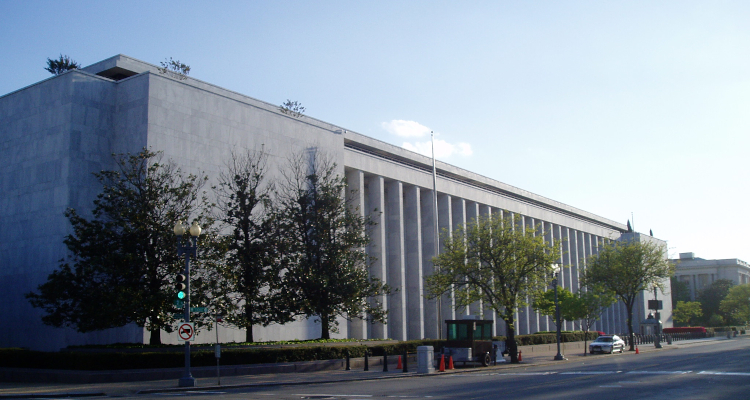
Washington, D.C.’s James Madison Memorial Building, which houses the U.S. Copyright Office.
After refusing to issue copyrights for illustrations created by artificial intelligence, citing the absence of “human authorship,” the USCO has published additional guidance on registrations involving AI.
U.S. Copyright Office (USCO) director and register of copyrights Shira Perlmutter just recently penned the AI-focused “statement of policy,” which arrives as artificial intelligence continues to play an increasingly significant role generally and in the music sphere.
Of course, it’s hardly a secret that multiple AI startups have in recent months closed substantial funding rounds, and automated processes are now extending to music creation, promotion, broadcasts, and much more. As a related aside, the RIAA and others today went ahead and announced the rollout of the “Human Artistry Campaign.”
“Copyright protection exists to help incentivize and reward human creativity, skill, labor, and judgment – not output solely created and generated by machines,” reads the RIAA’s lengthy release about the Human Artistry Campaign, which debuts as certain tools are enabling non-musicians to make songs. “Human creators, whether they use traditional tools or express their creativity using computers, are the foundation of the creative industries and we must ensure that human creators are paid for their work.”
Back to the USCO’s guidance on copyrighting media crafted with the assistance of AI, the government entity emphasized off the bat “that copyright can protect only material that is the product of human creativity.”
Stressing existing experience in assessing works “that contain human authorship combined with uncopyrightable material,” the USCO indicated that when it comes to AI, evaluations will on a “case-by-case” basis attempt to determine whether AI assisted in the creative process or drove said process with only limited human input.
“If a work’s traditional elements of authorship were produced by a machine,” the Copyright Office head continued, “the work lacks human authorship and the Office will not register it. For example, when an AI technology receives solely a prompt from a human and produces complex written, visual, or musical works in response, the ‘traditional elements of authorship’ are determined and executed by the technology—not the human user.”
The authorship distinction further hinges on whether AI users “exercise ultimate creative control,” according to the USCO resource, for when artificial intelligence “determines the expressive elements of its output, the generated material is not the product of human authorship” and therefore cannot be copyrighted.
However, select artificial-intelligence media “will also contain sufficient human authorship to support a copyright claim,” the Copyright Office relayed, mentioning specifically works created by AI and then altered by humans “to such a degree that the modifications meet the standard for copyright protection.”
In these instances, though, “copyright will only protect the human-authored aspects of the work,” the Office said of the complex and seemingly subjective topic, which, needless to say, relies heavily on applicants’ “duty to disclose the inclusion of AI-generated content in a work submitted for registration and to provide a brief explanation of the human author’s contributions to the work.”
“Individuals who use AI technology in creating a work may claim copyright protection for their own contributions to that work,” the USCO drove home, describing the appropriate procedures in relative detail. “For example, an applicant who incorporates AI-generated text into a larger textual work should claim the portions of the textual work that is human-authored.”
Seemingly leaving the door open for additional interpretation – and controversy – the Copyright Office likewise specified: “Applicants who are unsure of how to fill out the application may simply provide a general statement that a work contains AI-generated material. The Office will contact the applicant when the claim is reviewed and determine how to proceed.”
Finally, recognizing the far-reaching copyright implications of AI, the USCO also communicated that it intends to launch “an agency-wide initiative to delve into a wide range of these issues,” with plans “to publish a notice of inquiry later this year seeking public input on additional legal and policy topics.”
One of these topics will concern “how the law should apply to the use of copyrighted works in AI training and the resulting treatment of outputs,” the entity said.
